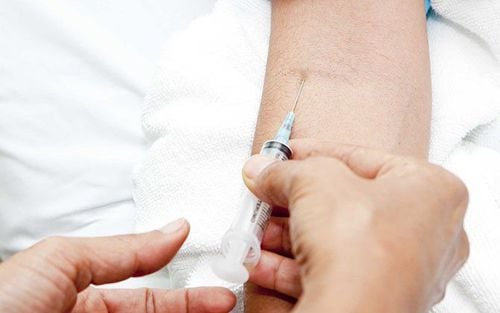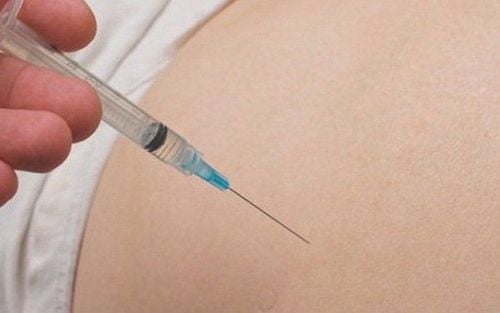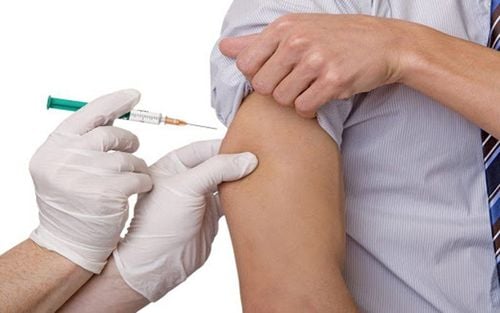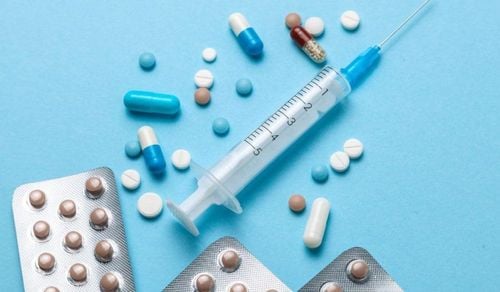This is an automatically translated article.
When using injection, the effect can be achieved faster and stronger. The drug can be administered in different ways, such as intravenously, intramuscularly, or under the skin. Either way, the principle of using injection drugs is to be followed to ensure the safety of the patient's health.
1. Definition of principles of safe use of injectable drugs
What are injections? These are sterile preparations, which can be suspensions, emulsions, solutions or dry powders when injected, freshly mixed into solutions or suspensions for injection into the body by different routes of injection.
Safe injection is the set of measures to optimally administer the injection to the patient. Healthcare workers practice safe injection including:
Using aseptic techniques to prevent blood-borne pathogens transmission to patients and healthcare workers. Adhere to the correct medication guidelines. Ensure effective treatment and care for patients. Minimize pain from injection as well as possible complications from injection drug use.
2. Principles of safe injection drug use
The principles of safe use of injections are as follows:
Choose the right vial. Check the name on the vial against your doctor's order to verify. Check the expiration date on the vial. Prepare injection only when ready for injection. Check the vial for contamination, including discoloration, precipitates, and if necessary, delay administration. Remove the vial protector and clean the rubber stopper with sterile prepackaged alcohol. Use new, sterile, individually wrapped needles and syringes for one use per patient. Wash hands before and after preparing, administering injections, wearing gloves. Withdraw the drug into the syringe, expose and disinfect the injection site. Administer the injection exactly as directed. Discard the needle and syringe immediately after use in the sharps container. Throw away the vial, even if there is any medicine left over. Instruct the patient to sit down and follow the injection. Record the report in the medical record.

Để sử dụng thuốc tiêm an toàn, cần phải chọn đúng lọ thuốc, kiểm tra lọ thuốc có bị nhiễm bẩn hay không.
3. What not to do in the safe use of injectables
Do not reuse needles and syringes, disposable vials, infusion tubes, or bags of intravenous solutions. Do not withdraw partial doses from separate vials to form a compound dose. Do not transfer medication from one syringe to another. Do not withdraw the medicine from the vial with a used needle or syringe.
4. Complications that can be encountered when using injections
Injections have more potential risks than other methods of drug administration. Patients are not only at risk of being exposed to the effects of the drug, but also of injection-related problems, such as:
Excipients : This is an ingredient added to alter the properties of the drug. the physical substance of the drug for easier use. Excipients are usually inactive and drugs taken orally or inhaled may still contain this ingredient. However, because the use of injections has a faster and stronger effect, there is an increased risk of hypersensitivity reactions to the drug or to the excipients in particular. Bacterial and viral infections: Injecting medication with an unsterilized or used needle can introduce bacteria and viruses into the body. As a result, an abscess can develop near the injection site, or bacteria and viruses can travel through the bloodstream to other parts of the body, such as the lungs, heart, brain, liver, or bones and cause damage. infection. Infection of the heart valves (endocarditis) is a common serious consequence of injecting drugs contaminated with bacteria or using dirty needles. In addition, sharing needles can spread other blood-borne infections, such as hepatitis B and C, and human immunodeficiency virus (HIV). Injury from the use of needles: The use of injections can cause scar tissue to form on the skin, especially when injected repeatedly or carelessly. Subcutaneous injection may cause skin sores. Intravenous injection leads to venous scarring, making the vein segment increasingly callous and difficult to inject, worse, reducing blood flow. In summary, the use of injections requires to be done in medical facilities. In each injection, safety principles must be strictly followed to ensure effective treatment, protect the patient's health and prevent the risk of blood-borne infection for both parties. In particular, medical facilities that organize injections must be equipped with adequate emergency conditions, to prevent bad cases that may occur.
Please dial HOTLINE for more information or register for an appointment HERE. Download MyVinmec app to make appointments faster and to manage your bookings easily.
References: Health.state.mn.us, Msdmanuals.com












